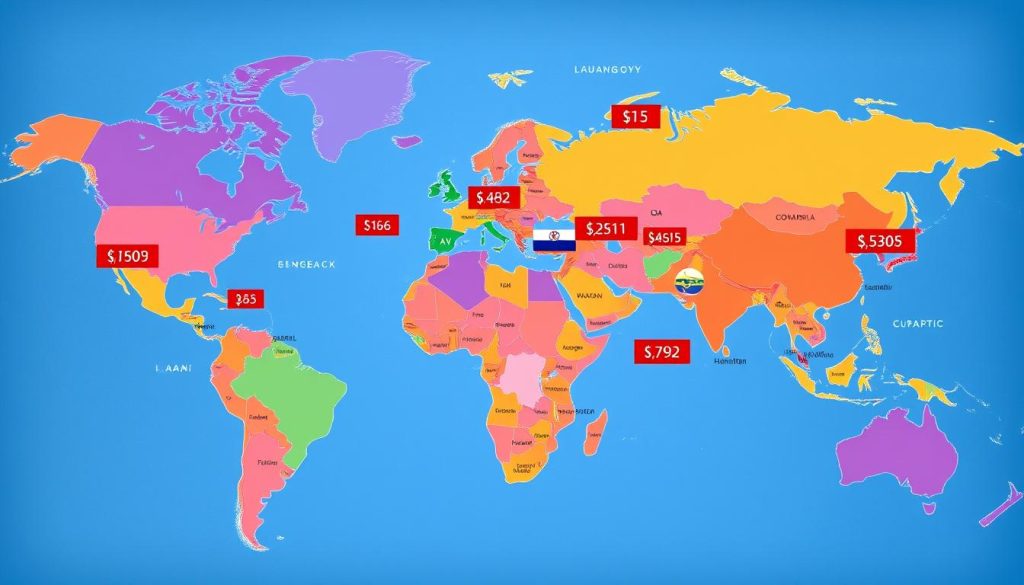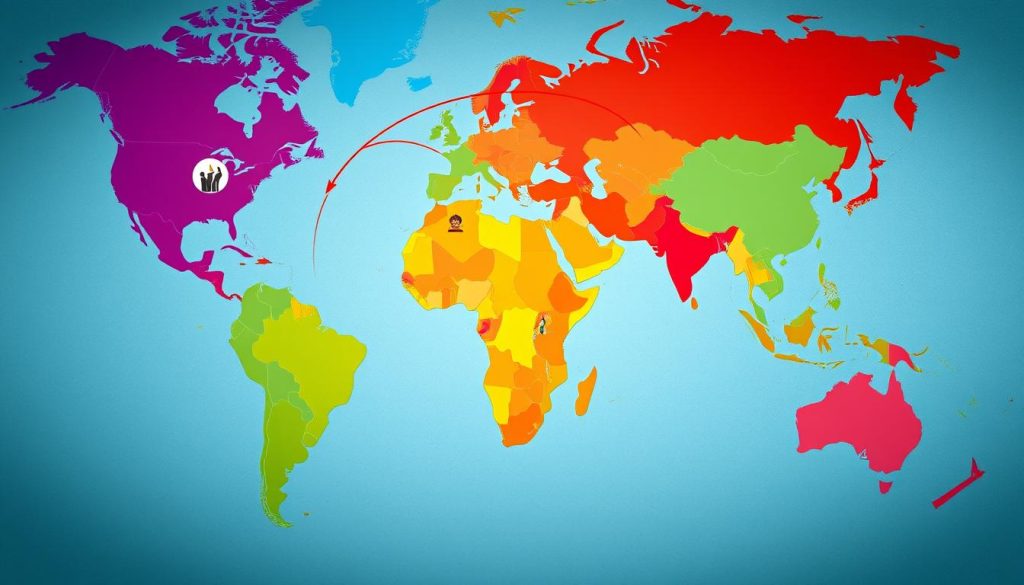Ever wondered why some companies succeed globally while others don’t? The global market is changing rapidly. A well-thought-out global business strategy is essential. Strategic planning is key for companies wanting to excel in international expansion.
Here, we explore the basics of business planning for UK firms eyeing international markets. Looking at market viability and matching global goals with company ambitions is crucial. We cover stories of UK firms that nailed their global strategy and share their success tips.
If you’re a start-up planning to grow or an existing business looking to expand, this guide is full of valuable insights. It’s designed to help you succeed on the international stage.
Understanding International Market Trends
In today’s interconnected world, grasping international market trends is vital for business growth. Through market analysis, companies gain precious insights. These help craft winning strategies.
With advanced research methods, businesses can understand various markets. This way, they meet global consumer needs better.
Researching Global Markets
To study global markets, businesses take a detailed approach. They gather info about market forces and consumer wants in different places. Using surveys and focus groups is key.
Understanding local cultures and demands becomes easier. Tools for data analysis are also crucial. They help predict future trends, guiding companies to smarter choices.
Analysing Consumer Behaviour
Looking into consumer behaviour uncovers what customers desire. Businesses segment markets by age, lifestyle, and more. This is done by looking at customer feedback and buying patterns.
Tracking interactions on social media is part of this. Thus, companies can adjust their products to fit varied tastes. Staying aware of global consumer trends keeps businesses ahead.
Regulatory Compliance and Legal Considerations
For businesses going global, understanding international law and compliance is key. UK companies must grasp many legal rules for smooth operations abroad. It’s crucial to know trade tariffs, follow local regulations, and understand foreign laws.
Handling compliance means knowing both international and local laws well. This knowledge helps companies dodge legal issues. Also, protecting intellectual property through legal checks is a must. It avoids expensive legal fights and keeps company assets safe overseas.
- Trade regulations: It’s vital to get trade tariffs and rules right to avoid penalties.
- Foreign legal systems: Understanding various legal systems is necessary for following local laws.
- Intellectual property: Safeguarding intellectual rights abroad prevents unauthorized use or copying.
To sum up, managing legal and compliance issues well requires broad legal know-how, sticking to regulations, and careful compliance strategies. Such an approach equips UK companies for success worldwide.
Developing a Global Business Strategy
Creating a strong global business strategy is important for companies looking to grow internationally. This process involves careful planning, setting goals, and identifying key performance indicators (KPIs). It makes sure global objectives are well-defined, achievable, and in line with the company’s main mission.
Setting Clear Objectives
For a successful global plan, companies must start by setting clear goals. They need to decide what they want to achieve in international markets. These goals must be specific, measurable, realistic, relevant, and time-bound (SMART). By setting these goals, businesses can focus their efforts and resources effectively.
It’s critical to think about both immediate and long-term goals. Immediate goals may include entering new markets, building brand recognition, and hitting initial sales figures. Long-term goals focus on gaining market share, consistent revenue growth, and becoming a market leader.
Defining Key Performance Indicators (KPIs)
Setting KPIs is crucial for tracking progress towards achieving business goals. KPIs are metrics that show how well a global strategy is working. They should match various areas of international business, like sales, customer happiness, and getting into new markets.
Some key KPIs for a global business strategy are:
- Revenue growth rate
- Market share percentage
- Customer acquisition cost
- Net promoter score (NPS)
- Customer retention rate
By regularly checking these KPIs, companies can make sure they’re on track with their strategic goals. Also, constantly reviewing and adjusting KPIs can help businesses cope with changing market conditions and business needs.
Financial Planning for International Expansion
Financial planning is key for going global successfully. A strong financial plan helps companies grow smoothly across different countries. It involves detailed budgeting, precise financial predictions, and deep knowledge of global trade finance.
Budgeting and Forecasting
Creating a good budget and forecasting future finances are vital for international growth. Firms need to prepare for changing costs and unforeseen expenses. By forecasting, companies can prepare for future cash needs and keep in line with their goals. This is crucial for making wise decisions.
Funding Options
Finding money for global ventures means looking at various sources. British companies have options like government grants, bank loans, and venture capital. Each choice offers benefits and possible negatives. It’s important to pick the right one after careful evaluation. Knowing about international finance helps manage the challenges of dealing with money across countries. This includes dealing with currency differences and understanding tax laws.
Adding these financial strategies to your planning can really boost your overseas business. It sets up a strong foundation for ongoing worldwide success.
Structuring Your International Business Operations
Getting your international business structure right is key to efficiency and staying competitive globally. A strong international setup depends on choosing the right business model and having a good global supply chain.
Choosing the Right Business Model
It’s vital to pick a suitable business model for success abroad. You have different models to choose from, each with its benefits and drawbacks. Your choice should align with your goals and resources. Among the popular options are:
- Joint Ventures: Working with local partners offers insights into the market and divides both risks and rewards.
- Franchises: This allows for quick growth with less upfront money by working with local business people.
- Wholly-Owned Subsidiaries: You’re in full control but it comes with big investments and bigger risks.
The business model you go with will change how your international operations work. This affects your strategy and how efficiently you run.
Establishing Supply Chains
A strong supply chain is essential for any international business. Managing a global supply chain well means looking at sourcing, logistics, and how you distribute products. Doing this well can cut costs and boost service. Key steps include:
- Find good suppliers: Strong relationships with trusted suppliers mean better quality and on-time deliveries.
- Make logistics better: Smoother transport processes lower costs and improve your business’s function.
- Bring in technology: Advanced software gives you the data you need to make smarter decisions.
Great supply chain management is crucial. It keeps your trading across borders smooth and keeps profits up.
Building a Strong International Team
Constructing an international team needs a deep knowledge of various cultures and how they work. To succeed globally, it is key to use extensive strategies for hiring and keeping employees from different backgrounds. This helps companies survive in the competitive international scene.
Starting with inclusive hiring is important for successful cross-cultural management. Companies must find talent that fits with their goals and respects diverse views. So, firms should focus on creating job ads for a worldwide audience. They should also use international job boards and unbiased hiring methods.
To keep a varied team, offer them support and chances to grow. Training in cross-cultural management is crucial for effective teamwork. These programs must teach about cultural differences, solving conflicts, and leading in an inclusive way.
Leadership is crucial in building a global team. Leaders must be culturally sensitive and flexible to help their teams face international challenges. They should promote a diverse workplace, encourage open talks, and set an example in cross-cultural understanding.
Working with international HR experts is also vital. They offer insights into local employment laws and cultural practices. This helps tailor policies to each area, supporting the global success of the company.
Marketing Strategies for Global Markets
For UK businesses aiming to go global, choosing the right marketing strategies is key. They must understand local cultures and likes to connect well with diverse audiences. This helps in building loyalty to the brand in various areas.
Localising Your Marketing Campaigns
To localise a brand, companies must modify their marketing to fit the target country’s culture, language, and norms. Firms like McDonald’s and Coca-Cola have done this well by changing their products and ads to match local preferences. Such efforts help in winning customer’s trust and making the brand more relevant abroad.
For successful brand localisation, consider these steps:
- Do thorough market research to grasp cultural differences and consumer habits.
- Ensure translations capture both the language and the cultural essence.
- Tweak visual and branding elements to suit local tastes.
- Work with local influencers and partners to enhance credibility and exposure.
Utilising Digital Marketing Channels
Today, using digital platforms is crucial for global outreach. Digital marketing lets brands connect with people through social media, emails, and content. Using these tools wisely can significantly boost a brand’s marketing worldwide.
Think about these digital marketing tactics:
- Make region-specific content based on digital analytics insights.
- Target ads on social media based on demographics and interests.
- Boost your search results visibility through SEO.
- Keep an eye on digital campaigns to tweak and enhance them.
By focusing on localisation and digital marketing, UK companies can tackle global market challenges. This is key for growing on the international stage.
Supply Chain Management for International Businesses
A well-managed supply chain is crucial for success in global markets. It involves joining different parts smoothly. This includes optimizing logistics, building strong supplier relationships, and creating effective procurement strategies.
Optimising Logistics
Improving logistics is vital for better efficiency and lower costs globally. Actions include:
- Implementing advanced tracking systems for goods movement monitoring.
- Using transportation management systems (TMS) for better routes.
- Creating plans for unexpected disruptions to keep logistics smooth.
By improving these areas, companies ensure on-time, cost-efficient deliveries. This is key to stay ahead in global markets.
Finding Reliable Suppliers
Strong supplier ties ensure quality and consistent supply chains. When looking for dependable suppliers, remember these points:
- Doing deep checks on the supplier’s reputation and trustworthiness.
- Choosing suppliers who can meet both present and future needs.
- Checking their financial health and if they follow international rules.
Building robust relationships and thorough vetting processes help manage risks and keep global operations going strong.
Technology and Its Role in International Business Planning
Technology is vital in today’s global business strategy. It helps UK firms stay ahead with better operations, insights, and supply chains. These improvements come from new tech tools.
Integrating Business Technologies
Adopting ERP systems and CRM software is key. They help manage resources and customer relations worldwide. This means companies can handle their international tech needs better, leading to smooth global work.
Leveraging Data Analytics
For international success, making decisions based on data is crucial. Analytics tools reveal trends, behaviours, and areas to improve. UK businesses, therefore, can make smarter choices. Using big data, they stay ahead in the global market. This makes companies quick to adapt and meet market changes.
Managing Cross-Cultural Teams
In today’s global business world, leading cross-cultural teams well is key. It lets us use diverse skills, views, and experiences to spark new ideas and achieve success.
One big challenge with diverse teams is making sure everyone communicates well. Leaders need to understand and respect cultural differences to avoid mix-ups and build strong teams. This means knowing how to listen and also watching for non-spoken signals and cultural habits.
Case studies from international firms, like Unilever and Google, show how vital good communication and respect are. These companies have done well by giving cross-cultural training and making workplaces where everyone feels valued.
To improve teamwork and productivity in varied cultures, we should follow certain steps. We need to:
- Encourage everyone to talk openly and give their views
- Train all staff in understanding different cultures
- Create common goals and values that everyone can get behind
By focusing on leading cross-culturally and managing diverse teams well, businesses can unlock their full potential. This leads to innovation and long-term success on a global scale.
Risk Management in International Business
Doing well in international business means managing risks carefully. You need to spot the risks and find good ways to keep them under control. This protects your business and helps it keep going strong.
Identifying Potential Risks
First, it’s really important to look closely at what could go wrong. In international trade, you might face issues like:
- Political Instability: Changes in government can shake up the markets. This can mess with your work and profits.
- Compliance Breaches: It’s key to understand and follow laws in different countries to avoid trouble.
- Market Fluctuations: Money values and economies can change fast. This affects deals with other countries.
Implementing Risk Mitigation Strategies
Creating a plan for handling risks around the world is smart. It means you’re ready before problems even start. Some good strategies include:
- Risk Assessment Methodologies: Use special methods to figure out how likely risks are and what they could do.
- Diversification: Don’t rely on just one place. Spread your work and money around to stay safer.
- Insurance: Insurance can take care of some risks so you don’t have to worry as much.
By really understanding the risks and having strategies ready, businesses can be better at managing risks. This makes their international work stronger and safer.
Strategies for Effective Communication Across Borders
In today’s world, talking clearly across borders is very important for businesses going global. They face many hurdles, such as language barriers that make communication tough. We will look at ways to deal with these challenges and talk about tools that help people work together worldwide.
Overcoming Language Barriers
Dealing with different languages is a big challenge when talking to people from other countries. A good way to solve this is by using professional translation and interpretation services. This makes sure all documents, emails, and meetings are correctly understood. Also, encouraging workers to learn basic phrases in the language of their overseas colleagues can help build stronger connections.
Utilising Communication Tools
Thanks to tech, we now have great tools for global teamwork. Platforms like Microsoft Teams, Slack, and Zoom let us message instantly, have video calls, and share documents easily. This makes working together much smoother. Using these platforms’ options for different languages means everyone can understand each other, no matter their native language.
By using these strategies and tools, communication across borders gets better. This leads to a united and effective global business scene. Making sure we communicate well is key to doing well globally. It helps companies work through cultural and language differences effortlessly.




















